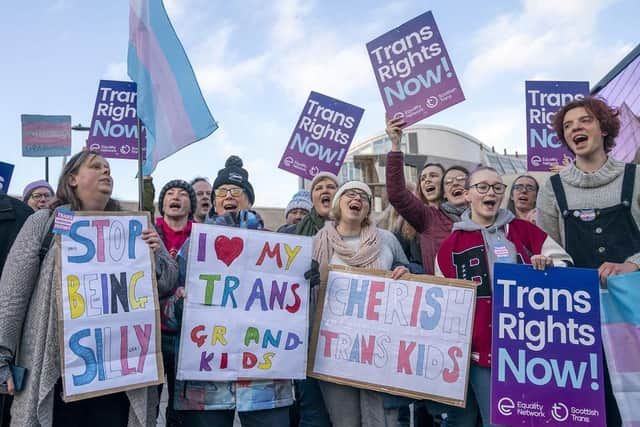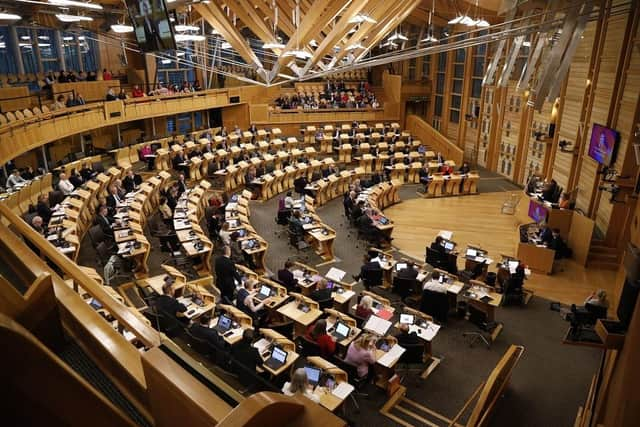Final vote on Gender Recognition Reform Bill delayed as MSPs debate amendments late into the night
This article contains affiliate links. We may earn a small commission on items purchased through this article, but that does not affect our editorial judgement.
MSPs were set to vote through the landmark Bill around gender recognition on Wednesday night, but delay tactics from opponents to the bill and the length of time spent discussing amendments resulting in the shift of the final vote to Thursday.
It means the stage three debate and vote will be the final act of the Scottish Parliament before Christmas and take place after First Minister’s Questions, the traditional denouement, on Thursday afternoon.
Advertisement
Hide AdAdvertisement
Hide AdThe delay comes after months of angry debate around the Gender Recognition Reform (GRR) Bill which seeks to simplify and de-medicalise the process through which a trans person can obtain a gender recognition certificate – a legal document that states they have changed gender.


However, the Bill has faced fierce opposition from opposition politicians, particularly the Scottish Conservatives, and critics within the SNP such as firebrand MP Joanna Cherry and former minister Ash Regan.
Opponents have labelled the Bill dangerous and open to abuse from sex offenders, whom they claim could use the simplified process as a means of gaining access to single sex spaces and assaulting women.
LGBT+ organisations are united behind the Bill, however, with supporters stating the reform helps reduce the trauma and barriers for trans people to be recognised in their acquired gender.
It is also a red line for the Scottish Greens within the Bute House Agreement, which governs the co-operation deal between the party and the SNP.


At the time of writing, MSPs continued to debate amendments to the Bill at stage three late on Wednesday night with a midnight finish was considered the most likely outcome. This followed a series of delays and extensions to the procedures.
These were predominately brought about by Scottish Conservative MSPs, who used points of order, wrecking amendments and interventions in an attempt to delay the final vote on the Bill to beyond Christmas.
The legislation, first consulted on in 2017, has had the second highest number days of parliamentary scrutiny of any non-Covid-19 Bill since the Holyrood election in 2021, and 100 days more than average. The Hunting with Dogs Bill, still at stage three, is the only legislation to be subject to a longer duration of parliamentary scrutiny.
Advertisement
Hide AdAdvertisement
Hide AdThe GRR bill is still widely expected to pass comfortably on Thursday, though with rebellions on all sides of the Parliament. The Government expects a rebellion of around nine SNP MSPs, while Scottish Labour – who agreed to back the bill on Tuesday – were expecting a rebellion of around five.
The Scottish Liberal Democrats will also support the final bill, alongside the Greens and at least two and potentially as many as six Conservatives who have been allowed a free vote on conscience grounds.
MSPs supportive of the Bill fumed throughout Wednesday as the debate, which was delayed by more than hour on Tuesday, suffered further delays and suspensions in a further descent into farce. In the late afternoon, a bid from Scottish Tory MSP, Rachael Hamilton, for a manuscript amendment to be heard saw proceedings delayed for around an hour.
The bid was eventually rejected by the presiding officer, with some amendment groupings having their time limit extended by two hours to allow for a full debate. It is understood standing orders may be strengthened to avoid a repeat of what one MSP labelled “abuse” of parliamentary procedures.
It was not until around 8pm that the parties agreed to delay all remaining business other than amendments, which included portfolio questions and the final debate, until Thursday.
On Wednesday, the scrutiny of the Bill started at 1:15pm as a demonstration of a few hundred anti-reform protesters heard speeches from Ms Regan and Ms Cherry gathered in front of the Parliament building.
Ms Cherry, the Edinburgh South West MP, said fellow SNP representatives in Westminster and Holyrood were “scared to speak out” on gender reform at the protest.
She said: “I know for a fact that there are people in both the Westminster and the Holyrood groups who have serious reservations about this legislation, but who have felt unable to speak out. I think some people are scared to speak out in this debate because when you do speak out, you’re often wrongly branded as a transphobe or a bigot.
Advertisement
Hide AdAdvertisement
Hide Ad“In my case, I was kicked off the SNP front bench for speaking up for women’s rights or for lesbians’ rights.
“And I’ve also received rape and death threats and, as is a matter of public record, I’ve had no public support from my political party despite those rape and death threats, so I think many parliamentarians are just trying to keep out of this debate because they’re afraid to speak up.”
Ms Cherry said existing proposals lacked “sufficient safeguards” and stressed her calls for First Minister Nicola Sturgeon and social justice secretary Shona Robison to hold a citizens’ assembly on the issue “fell on deaf ears”.
Speaking in favour of her own amendments to the Bill in the chamber, Ms Regan said the legislation would put the safety of women and girls at risk.
“I would say to my fellow parliamentarians – it boils down to this – do you think women will be more or less safe as a result of this law?” she said. “And if you have any doubt, any doubt at all that it will make women and girls less safe, then you cannot vote for it.”
The Bill has been one of the most controversial in Holyrood since devolution due to the online debate around its potential impact on women’s rights and opposition from high-profile individuals such as Harry Potter author JK Rowling.
However, the Scottish Government insists the legislation will not impact the Equality Act, which allows for trans people to be excluded from single-sex spaces such as changing rooms and shelters, something that was affirmed by an earlier amendment from Labour’s Pam Duncan-Glancy.
Once enacted, the Bill will lower the minimum age for applicants to 16 and drop the time required for an applicant to live in their acquired gender from two years to three months – six for people aged 16 and 17 – though with a three-month reflection period.
Advertisement
Hide AdAdvertisement
Hide AdOn Tuesday, MSPs backed a change tabled by SNP MSP Gillian Martin to the law that means anyone subject to a sexual harm prevention order or sexual offences prevention order will not be allowed to seek a GRC.
Meanwhile, a push by another SNP MSP to ensure applications are paused if an applicant is charged with a sexual offence until their case is disposed of divided members by 61 votes to 61 – as is customary deputy presiding officer Liam McArthur used his casting vote against the change.
Want to hear more from The Scotsman's politics team? Check out the latest episode of our political podcast, The Steamie.
It's available wherever you get your podcasts, including Apple Podcasts and Spotify.
Comments
Want to join the conversation? Please or to comment on this article.
